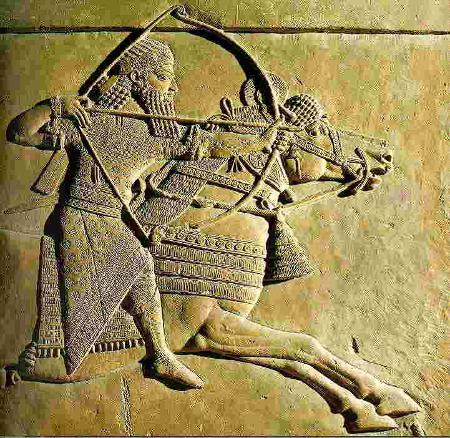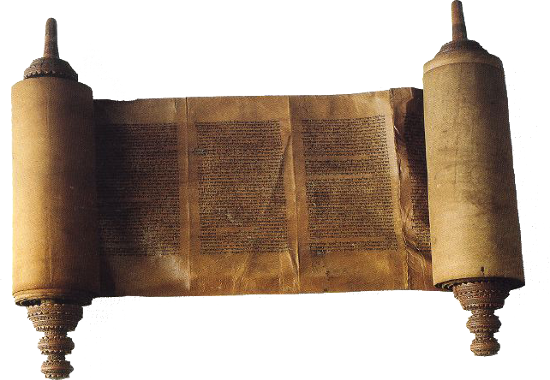A Pepper Grinder Post
Hezekiah's Troubles
Hezekiah had big problems. He was king of the tiny kingdom of Judah (many years after the larger northern kingdom of Israel had split off from it), and he was being threatened by the dominant superpower of that part of the world—Assyria. It was earlier in Hezekiah’s reign that Assyria had conquered Israel and deported most of its inhabitants. Hezekiah was having success against local enemies, and we are told that he rebelled against the king of Assyria early in his reign. Assyria appears to have left him alone until 14 years into Hezekiah’s reign, probably simply because the Assyrians had bigger fish to fry. When the Assyrians did turn their attention to Judah, they captured all the fortified cities of Judah except Jerusalem. At this point, victory was just a matter of time. All the Assyrians had to do was lay siege to Jerusalem and wait for the city to be starved into submission.
Hezekiah now had second thoughts, and he paid the king of Assyria such a large amount of tribute that he was forced, not only to empty the royal and Temple treasuries, but even to strip off the gold that was adorning the doors and doorposts of the Temple. The Bible doesn’t actually say what the Assyrians did as a result of receiving this payoff (though Assyrian annals do mention receiving the payment). I would presume that they withdrew for some period of time.
 What we do know is that at some point after this, the Assyrians came back to threaten Jerusalem again. The way the account in 2 Kings of the payoff to the Assyrians (18:16) is followed immediately by the Assyrians threatening Jerusalem again (18:17), leaves me with the feeling that God is trying to make a point like, “Well that did them a lot of good, didn’t it?”
What we do know is that at some point after this, the Assyrians came back to threaten Jerusalem again. The way the account in 2 Kings of the payoff to the Assyrians (18:16) is followed immediately by the Assyrians threatening Jerusalem again (18:17), leaves me with the feeling that God is trying to make a point like, “Well that did them a lot of good, didn’t it?”
The Assyrian messengers engaged in a propaganda campaign by yelling out to the people in Jerusalem that they would starve if they held out against Assyria, and that their God could no more deliver them than the gods of other nations the Assyrians had conquered had saved them. Hezekiah humbled himself before God, and God promised, through Isaiah the prophet, to deal with the Assyrians. At this point, the Assyrian envoys temporarily withdrew because the king of Assyria and his army had moved and started fighting another battle. Some time after that, the Assyrians got word that the king of Egypt was marching out to fight them. Even though Assyria had gained the upper hand against Egypt, the Land of the Pyramids was still a force to be dealt with. Lest Hezekiah think he was now safe from Assyria, the king of Assyria sent him a message. This is where our passage picks up.
Hezekiah took the letter from the messengers and read it. Hezekiah went up to the house of Yahweh* and spread it out before Yahweh. Hezekiah prayed before Yahweh and said, “Oh Yahweh, the God of Israel, who sits between the Cherubim, you alone are God over all the kingdoms of the earth. You made the heavens and the earth. Open your ears and listen, Yahweh; open your eyes and see. Hear Sennacherib’s words, which he sent to reproach the living God. It’s true, Yahweh, that the kings of Assyria have devastated these peoples and lands and fed their gods to the fire, because they were not gods, but pieces of wood and stone shaped by men, and they destroyed them. Now, O Yahweh our God, please save us from his hand, and all the kingdoms of the earth will know that you alone, Yahweh, are God. 2 Kings 19:9-19 (my translation)
Humanly speaking, there was no hope. What I want to look at is what Hezekiah did in this situation.
- He faced the facts. The first thing this passage says the king did was read the letter from the Assyrians. When I am in a discouraging situation, my natural tendency is not to think about it. I get the impression that God doesn’t like this, because what seems to happen whenever I try to avoid reality is that God rubs my nose in it until I finally face up to it. Save yourself some trouble. Read the letter. Face up to just how bleak the situation is.
 He spread out the letter before the Lord. Okay, we could make this sound spiritual and say that Hezekiah “took it to the Lord in prayer,” but I think this weakens what he did. The Israelites were into tangible physical signs for spiritual realities, and God seems to have encouraged this by commanding them to do everything from smearing blood on their doors to living outside in shelters made of branches one week a year. I think there is something that touches us in a more real way about doing something physical than if we just click a link on our smart phone or pray a prayer in our mind. Hezekiah was, in effect, saying, “Look at this, Lord! See what they’re saying about you?” Did God need to read that letter to know what was in it? Of course not. But I have to think that that there was something about spreading that scroll out in the Temple that made the whole thing more real for Hezekiah.
He spread out the letter before the Lord. Okay, we could make this sound spiritual and say that Hezekiah “took it to the Lord in prayer,” but I think this weakens what he did. The Israelites were into tangible physical signs for spiritual realities, and God seems to have encouraged this by commanding them to do everything from smearing blood on their doors to living outside in shelters made of branches one week a year. I think there is something that touches us in a more real way about doing something physical than if we just click a link on our smart phone or pray a prayer in our mind. Hezekiah was, in effect, saying, “Look at this, Lord! See what they’re saying about you?” Did God need to read that letter to know what was in it? Of course not. But I have to think that that there was something about spreading that scroll out in the Temple that made the whole thing more real for Hezekiah.
I tried this myself recently. I was worried about one of my children. I was at work, and I was so worried that I couldn’t focus at all on what I was doing. Finally, I wrote a phrase on a piece of paper that summed up the thing that concerned me, and I went out to my car. I laid the paper down on the passenger seat and started begging God to help and crying (I hardly EVER cry).
I will not say that the problem instantly went away, but I do think that things started getting better from that moment on.- He acknowledged God’s greatness. Hezekiah didn’t start out talking about his troubles, but first said, Oh Yahweh, the God of Israel, who sits between the Cherubim, you alone are God over all the kingdoms of the earth. You made the heavens and the earth.
As a father, I can tell you that I would like it better if a child came to me and started out with, “I love you, Papa,” (especially if I didn’t think they were just saying it to get what they wanted) than if they just launched into, “Can I …” I don’t think God is so different from us in this. I also believe that it is good for us to remember God’s greatness. When I have a problem, I tend to see it as all-consuming. It’s good to remember that there are things, and most importantly, a person, who is way bigger than our issues. - He told God about his problem. Hezekiah almost sounds disrespectful here (Open your ears! Open your eyes!), but I believe he is just honestly expressing his desperation. He is also approaching God as if he were a person. Is God far above and beyond us in his abilities and his perfection? Absolutely. On the other hand, the Bible also clearly says that we are made in God’s image, and it presents God as having feelings like ours.
How does God react to Hezekiah talking to him like this? Does he rebuke him for his impertinence? Does he remind Hezekiah gently that, as a spiritual being, he has no ears and eyes? Not at all.
And what happens as a result of this prayer? To put it in crass, bottom-line terms, does it work? Here is what we find later in the same chapter:
That night the angel of the LORD went out and put to death a hundred and eighty-five thousand men in the Assyrian camp. When the people got up the next morning--there were all the dead bodies!
So Sennacherib king of Assyria broke camp and withdrew. He returned to Nineveh and stayed there.
One day, while he was worshiping in the temple of his god Nisroch, his sons Adrammelech and Sharezer cut him down with the sword, and they escaped to the land of Ararat. And Esarhaddon his son succeeded him as king. 2 Kings 19:35-37 (NIV)
Although God eventually did away with the kingdom of Judah because of their sins, just as he had done with the rest of Israel, he used Babylon, not Assyria. Assyria never again posed a real threat to Judah.
- Pepper
Posted 2015-01-18
*You might be wondering why “Yahweh” is sprinkled throughout my translation of 2 Kings 19:9-19 and lots of my other Old Testament translations. Many translations say, “The Lord,” or perhaps, “The LORD,” instead. This practice dates back to the Jews, who, fearful of using God’s name in vain, would say “Adonai” (Hebrew for “my Lord”) when they were reading a passage that contained “Yahweh.” Yahweh is simply an English transliteration of the name that the Lord gave himself when speaking with Moses in Exodus 3. (Jehovah is an older transliteration, but most scholars think that Yahweh is a lot closer to the original Hebrew.) I use Yahweh because it is God’s personal, intimate name that he provided just for his children. Saying “the Lord” seems to me to make Hezekiah’s words too impersonal.
**Photo of scroll from fatherjohn.blogspot.com
